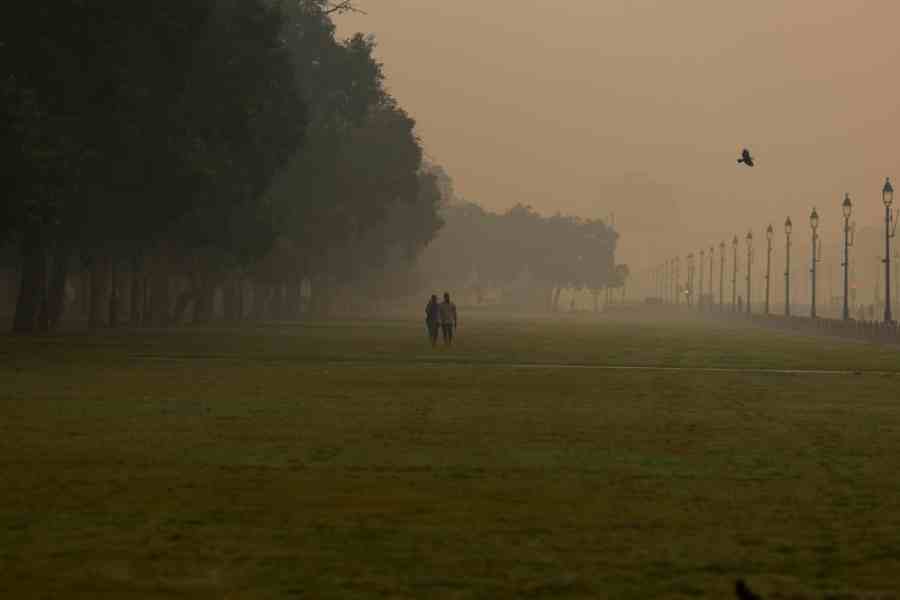Turn to art
Sir — Seasons are disappearing — thanks to climate change. Calcutta barely had a peek at autumn this year owing to the rains. What is being effaced along with some of the seasons is the blue sky. The delight of watching a sunlit, blue, wintry sky is getting rarer. Atmospheric pollution — entirely the doing of humans — leading to a pall of haze hanging over cities around the world has left us with jaundiced — yellow — skies. Perhaps the only way of savouring what is now gone is to turn to art. John Constable’s cornflower blue sky in Study of Sky and Trees could lift not the haze but the gloom in our heads.
Dipti Ray, Calcutta
Too ambitious
Sir — A letter of intent sent by India to the Future Host Commission of the International Olympic Committee is a step towards fulfilling the country’s dream of hosting the Olympics in 2036. However, the Indian Olympic Association itself faces various internal conflicts. The power struggle between the IOA president, P.T. Usha, and the executive board has left athletes in a vulnerable position. This was demonstrated during the recent protests by the wrestlers.
Securing hosting rights for the Olympic Games follows a highly scrutinised process overseen by the IOC and the Future Host Commission. The governing bodies meticulously evaluate bids from potential host cities based on a range of criteria, including infrastructure, financial strength and the ability to deliver a sustainable and memorable hosting experience. The IOA must solve its domestic problems before aiming for an ambitious international sporting event.
Ranganathan Sivakumar, Chennai
Sir — As India officially enters the race to bid for Olympics, one wonders if it is truly ready to host an event of such magnitude when the IOA itself is struggling due to internal conflict. Hosting the Olympics might showcase India’s soft power but it can also burn a hole in the exchequer’s pocket. Some estimates suggest that this could cost India up to 50 billion dollars. In a nation reeling from unemployment and hunger, hosting the Olympics seems to be a case of misplaced priorities. It shall surely deliver the government electoral gimmicks but will have no real benefit for the citizens.
Gurnoor Grewal, Chandigarh
Sir — Several countries are interested in hosting the 2036 Olympics. Among them are Turkey, Chile, Indonesia, Egypt, South Africa, South Korea, Qatar, Saudi Arabia, England, Italy, Denmark and Canada. India can benefit from hosting the Olympics as the event will usher in economic progress. Transportation and tourism industries will boom. Furthermore, Indian athletes will also come under international spotlight. This can be a great show of soft power
for India.
Shantaram Wagh, Pune
Sir — India, along with many other nations, has formally entered the race to become the host nation for the 2036 Olympics. Although India has not named any host city, Ahmedabad or Gandhinagar will surely be the Centre’s obvious choice. Considering the importance of India in the Global South, it needs to come forward to shoulder the responsibility of global events that can generate significant employment.
Dimple Wadhawan, Kanpur
Tragic fall
Sir — Thirty-six people died when an overcrowded private bus plunged down a gorge in Uttarakhand (“36 die as ‘rundown’ bus falls into Almora gorge”, Nov 5). The transport department should be answerable for allowing a decade-old bus to operate on the rickety roads in a hilly area. Indians often have to pay the price of the negligence of the transport authorities.
Ananda Dulal Ghosh, Howrah
Sir — A bus accident in Uttarakhand resulted in the death of 36 people, injuring 19 others. Although such incidents happen frequently, the ministry of road transport remains nonchalant about tightening security checks. The bus was carrying 13 passengers above its seating capacity, resulting in the loss of balance. Overcrowded buses roam Indian cities daily and authorities refrain from taking any action.
Jakir Hussain, Kanpur
Eat right
Sir — The World Health Organization has set guidelines regarding the intake of sodium in packaged foods. According to the study, high sodium intake is a leading cause of serious illnesses. The study also examined the health and the economic benefits that one can reap by following these guidelines in India where the consumption of packaged food is on the rise. Packaged food is a dietary staple in many developed nations. Countries like India can still escape that fate by lowering their packaged food consumption.
Strict adherence to the guidelines can prevent nearly 3,00,000 deaths and 2.4 million cases of heart disease, strokes and kidney disease. Reduced consumption of salt could lead to savings of nearly $800 million in healthcare costs. The Union health ministry must take cognisance of the matter.
M. Pradyu, Kannur











